Forex Taxation Basics
Post on: 3 Май, 2015 No Comment

Forex Taxation Basics
For beginner forex trader, the goal is simply to make successful trades. To try their hand involved can be realized in an instant, many investors have to think long before — in a market where the profits — and losses. Regardless of whether you are planning on a career or what forex to see how you are interested in your strategy pans out, there are tremendous tax benefits that you should take into consideration before making your first trade. (For more go check out our Forex Walkthrough from beginner to advanced.)
While Forex trading can be confusing to master a field, filing taxes in the U.S. for your win / loss ratio is reminiscent of the Wild West. Here is a breakdown of the one thing you should know.
Options and Futures Investors
Forex traders, specializing in options and / or futures can be grouped into so-called IRC 1256 contracts known. These IRS-sanctioned contracts mean dealers will allow for a lower-tax 60/40. What this means 60% of the profits or losses are recognized as long-term capital gains / losses and counted the remaining 40% as short-term. (For background reading, see Getting Started In Forex Options.)
The benefits of this tax treatment are as follows:
Time: Many forex futures / options traders make more transactions per day. Of these transactions, up to 60% as long-term capital gains / losses are counted.
Tax Rate: taxed the trade in shares (instead of less than 1 year), investors are at the 35% short-term rate. When trading futures or options, investors are at a 23% rate (calculated as 60% long-term by 15% max plus 40% short-term interest rate by 35% maximum rate) is taxed.
Over-the-counter (OTC) Investors
Most dealers are taxed according to local IRC 988 contracts. These contracts are to be paid for foreign exchange transactions within two days so that they are open for ordinary gains and losses reported to the IRS. If you spot forex trading, you will probably be divided automatically into this category.
The benefits of this tax treatment are as follows:
Loss Protection: If your losses by the end of trading, as a 988 Dealers categorizes experience serves as a great advantage. As in the 1256 contract, you can get all your losses as ordinary losses rather than just count the first $ 3,000.
Comparing the two
IRC 988 contracts are easier than IRC 1256 contracts in that the tax rate remains constant for both gains and losses — an ideal situation for losses. 1256 contracts, while complex, offer more savings for a dealer with a net profit — 12% more.
The most significant difference between the two is that the expected gains and losses.
The solution was to carefully choose your category
Now comes the hard part: deciding how to file taxes for your situation. What makes foreign exchange filing is puzzling that while separately the options / futures and OTC are grouped, you as an investor can either choose a 1256 or 988 contract. The tricky part is that before the first January of the year to decide trade.
The two types of forex submissions conflict, but in most accounting firms, you are subject to 988 agreements, if a dealer location and 1256 contracts, if you are a futures trader. The key factor is to speak with your tax advisor before investing. Once you start trading you can not switch 988-1256, or vice versa.
Most dealers are expected net profits (why act otherwise?) They want to elect one of their 988-status and the status until 1256. The exit from the A 988, you need to make an internal memo in your books, and file with your tax advisor.
These complications increased when shares and trading of currencies. Equity transactions are taxed differently, you may not be able to give 988 or 1256 contracts to choose depends on your status. (For a different solution to tax issues, see Benefits Abound for active traders on the integration.)
Keeping Track: Pick up your game

Instead of relying on your brokerage statements, tax-friendly and more accurate way of tracking profit / loss record of your game. This is an IRS-approved formula for records:
Subtract your assets from the beginning of the end of your assets (net)
Subtract cash (your account) and add vents (by their account)
Subtract income from interest and add interest paid
Add other business expenses
The performance record formula will give a more accurate representation of your profit / loss ratio and end of year filing easier for you and your accountant. (For more information about the Top 4 Things Successful Forex traders do.)
Things to Remember
When it comes to forex taxation, there is are a few things to keep in mind is also:
Deadlines for submission: In most cases, you are obligated to one type of tax situation until 1 To select January. If you are a new trader, you can make this decision before the first trade — be it in the January 1 or 31 December is. It is also worth noting that you can change your status mid-year, but only with the consent of the IRS.
Detailed records: Keeping good records (and backups), you can save time when tax season is approaching. This gives you more time for trading and less time to prepare taxes.
The importance of payment: Some dealers try, Beat the System and earn a full or part time income forex trading without paying taxes. Since over-the-counter trading is not with the Commodities Futures Trading Commission (CFTC), some traders believe that they could get away with it registered. This is not only unethical to catch up, but the IRS and tax evasion charges will eventually be no taxes you owe stocking.














